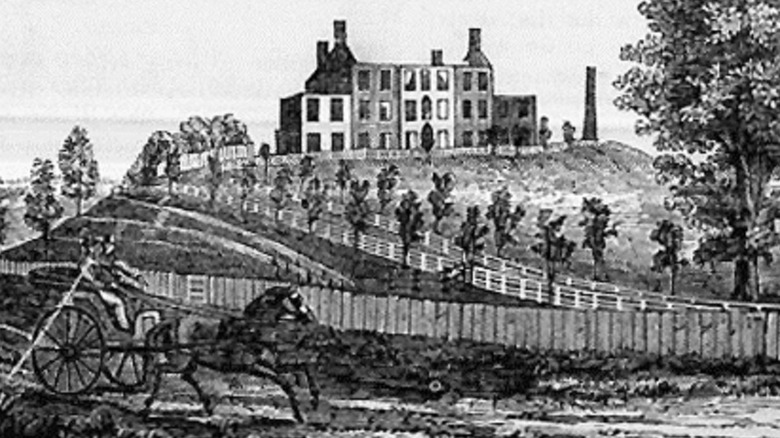The Tragic Story Of The Ursuline Convent Riots
At approximately 11 p.m. on August 11, 1834, an angry mob of Protestants gathered outside the Ursuline Convent in Charlestown, Massachusetts (now Somerville), and set fire to tar barrels outside the walls. The mob broke into the building through windows and doors and also set fire to it, which eventually burned to ashes in the early morning hours of August 12 (via McGill University.) The event is now known as the Ursuline Convent riots.
The Ursuline Convent, established in 1820, was an educational institution for girls run by Roman Catholic nuns, the Ursuline Sisters, from Montreal, Canada. At about the same time, anti-Catholicism was still rampant in New England, and it was the working-class Protestants who were primarily outraged by the Irish Catholic Immigrants who were taking over the labor force and threatening Protestantism.
Catholics were not legally allowed to be in Massachusetts until 1692 and were only able to publicly practice their religion in 1780 with the new state constitution that allowed religious freedom (via Mass Moments.) By the 1830s, the Ursuline Convent became the center of controversy, with rumors spreading about illicit activities and dubious rituals going on inside its walls.
The Ursuline Convent
The Ursuline Convent was initially established to be a boarding school for Catholic girls. There, nuns taught students arithmetic, writing, botany, and chemistry, among other things (via American Heritage.) However, the majority of the girls enrolled at the institution were Protestants from upper-class families. With a population of about 50 to 60 students, fewer than 10 were Catholics.
Before the riots, Charlestown received reports of a woman who had attempted to escape the convent after being kept there against her will. Local newspapers ran stories with controversial headlines speculating on the activities happening inside the convent, going as far as saying it was a place of torture and grisly murders. Although some papers retracted their statements, the news has already spread and further ignited the hate that some Protestants had for the Catholics. It also didn't help that the Ursuline Convent's Mother Superior, Sister Mary Edmond St. George, was said to be an assertive and arrogant woman, per Mass Moments.
The working-class Protestants took action. They pressured authorities to investigate the convent, and if they didn't, the Protestant citizens would take matters into their own hands. Messages on placards were posted in the areas of Boston, according to McGill, saying, "It is your duty gentlemen to have this affair investigated immediately. If not the Truckmen of Boston will demolish the Nunnery thursday night — August 14."
The riots and the aftermath
On the evening of the fire, a group of Protestants knocked on the doors of the Ursuline Convent and exchanged a few words with the Mother Superior, asking her to release the woman who was there against her will. They then forced themselves inside the convent as the nuns and students escaped through the back of the convent, according to the University of Notre Dame.
The rioters were destructive, wrecking everything they saw inside the convent, including books, furniture, instruments, and religious items before setting fire to the building. The next day, a committee of citizens was formed to investigate the riot as well as the rumors. Per Mass Moments, the accusations against the nuns were unfounded. Only 13 men were arrested for joining the riots, and in the end, only one man was convicted; he was later pardoned.
The people of Boston were outraged, and even Protestants showed their disgust over the riot. Rev. Lyman Beecher, a Presbyterian who focused his sermons on anti-Catholicism, condemned the rioters after the incident (via American Heritage.) The Ursuline Convent was never rebuilt after the fire.


